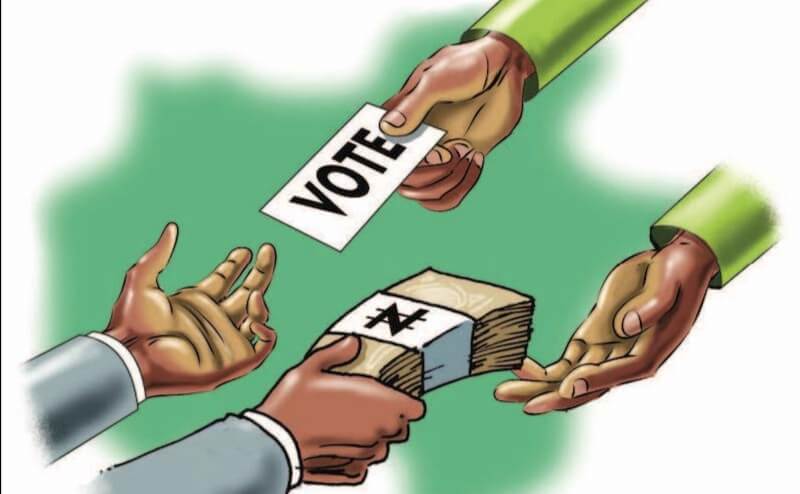
This article will examine the impact of vote buying in Nigeria elections. Vote buying is an illegal practice everywhere in the world where a candidate or party supporters offer material goods, money, or other incentives to voters in exchange for their vote or support. This unethical political practice is considered a violation of democratic principles because it undermines the integrity of any electoral process and can lead to a skewed representation of the voters’ will.
Vote buying and selling can take many forms, ranging from direct cash payments to offering goods or services, such as food, transportation, or medical care, in exchange for votes. In some climates, voters also use the promise of future benefits, cash or jobs to sell their votes, which is also illegal and unethical.
Vote buying is a serious problem in many countries, particularly in developing nations like Nigeria with weak democratic institutions and a lack of electoral oversight. It can lead to a distorted political landscape, where wealthy candidates or parties can use their resources to sway the outcome of an election, regardless of their actual support among the electorate.
Vote buying is the act of exchanging money, gifts or other incentives in return for a voter’s vote in an election. In Nigeria’s electoral process, vote buying practice has become a major issue particularly in recent years. The effects of vote buying on the country’s elections are widespread and damaging. Here are some of the impacts of vote buying in Nigeria’s elections:
Vote buying undermines the credibility of Nigeria’s electoral process. When voters receive money or gifts in exchange for their vote, the integrity of the election is compromised. Voters may be more likely to vote for a candidate based on what they will receive, rather than on their qualifications, values or policies. This undermines the principle of free and fair elections and leads to a lack of trust in the electoral process.
Vote buying leads to the emergence of incompetent leaders. When candidates are elected based on their ability to pay for votes rather than their qualifications, campaign manifestos and experience, the quality of leadership suffers. This is because such leaders are not necessarily the best suited for the position, but rather the ones who were able to outspend their opponents. Consequently, Nigeria is likely to be governed by leaders who lack the skills, character and competence required to effectively lead the nation.
Vote buying encourages corruption. When politicians feel the need to spend large sums of money on buying votes, they are likely to engage in corrupt practices to obtain the funds they need. This could include embezzlement of public funds, bribery, and other illegal activities. Corruption has a negative effect on the country’s economy, as it discourages foreign investment and leads to a decline in economic growth.
Vote buying perpetuates poverty. When politicians buy votes, they are effectively taking advantage of the poor and vulnerable in the society. These voters are often the ones who are most in need of assistance from the government. However, when politicians are more concerned about buying votes than providing the necessary social services, the needs of the poor are neglected. This perpetuates poverty and exacerbates existing inequalities in the country.
Vote buying undermines democracy. In a democratic society, the people are supposed to have the power to elect the right leaders. However, when politicians are able to buy votes, this power of the people is effectively taken away from them. This undermines the very foundation of democracy as the government of the people and leads to a situation where the people’s voices are not heard.
Vote buying leads to electoral violence. In some cases, the act of buying votes can lead to insecurity and unrest. This is because candidates may be unwilling to accept the results of an election that they believe was influenced or rigged by vote buying. This can lead to protests, riots, and even armed conflict as seen in recent elections in Nigeria.
Vote buying is a waste of resources. When politicians spend large sums of money on buying votes, they are diverting resources that could be used for more productive purposes like investment in agriculture, technology and social amenities. This includes funds that could be used to improve infrastructure, provide better healthcare, and support education. When these resources are used for vote buying, the entire country suffers and the economy shrinks.
Vote buying reduces voter turnout. When voters believe that their votes do not matter, or that the outcome of the election has already been determined by the candidate who can outspend their opponent, they are less likely to participate in the electoral process. This reduces voter turnout and undermines the legitimacy of the election.
The effects of vote buying on Nigeria’s elections are far-reaching and damaging. This practice undermines the credibility of the electoral process, perpetuates poverty and corruption, leads to the emergence of incompetent leaders, undermines democracy, and leads to violence.
It is important for the Nigerian government, civil society organizations (CSOs) and electoral authorities (INEC) to take steps to eliminate this practice and ensure that elections in Nigeria are free and fair. This could include increasing transparency in campaign finance, providing more education to voters about the dangers of vote buying and selling, and enforcing laws against these violations.
To combat vote buying, many countries have implemented laws and regulations that prohibit the practice and establish penalties for those who engage in it. Additionally, international organizations such as the United Nations and the Organization for Security and Cooperation in Europe have also developed guidelines and recommendations for election monitoring and transparency to ensure free and fair elections.